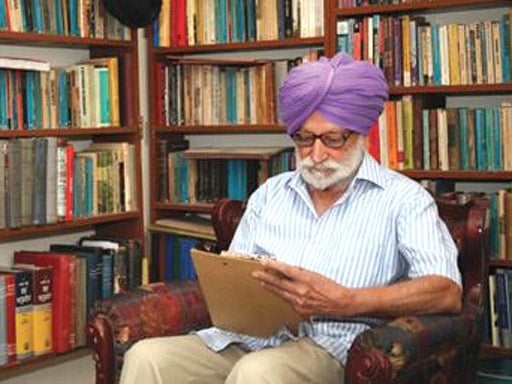Love's labour: the complete works of Shakespeare now available in Punjabi

Surjit Hans’ interest in the works of William Shakespeare was first sparked when he was a student, but it was not until he had retired from academia that he started on the labour of love in which he would lose himself and which took two decades to complete.
Now, the 82-year-old has finally completed his translation of Shakespeare’s rarely performed Henry VIII into Punjabi, marking the 38th and last of the Stratford Bard’s plays to be made available in the South Asian language. An estimated 100 million people speak Punjabi, mainly in India, Pakistan, Britain and Canada.
“It started in my college days when I played a minor part in Macbeth,” Mr Hans, who studied at Punjab University in Hoshiarpur, told The Independent. “And then I played the role of Laertes in Hamlet.”
Mr Hans began translating the plays in 1993 when he retired as head of the department of history at the Guru Nanak Dev University in the Punjab city of Amritsar. The first work he translated was Othello. For each translation, he received 8,000 rupees (£100), which he reckoned worked out as around 40 rupees a day. He averaged two plays a year.
The retired academic said he hoped performances of his translations would be staged and he said he believed Punjabi audiences would respond well to Shakespeare’s stories because of the “commonality of themes”. He believes it is unfair that Shakespeare’s works should only be available to those who speak English.
No north Indian aware of the story of the emperor Aurangzeb, a conservative Mughal ruler of the 17th century who imprisoned his father and murdered his brother, could fail to be moved by the intrigues contained in King John, Mr Hans says. At the same time, The Two Noble Kinsmen, with its tale of two cousins fighting to the death over the affections of the same woman, has parallels with the plots of many Bollywood films.
“Take for example the treatment of the elderly in King Lear – well, we leave thousands of old people at the Kumbh Mela [Hindu festival] because we cannot afford to keep them,” he said. “Also, there is the issue of arranged marriage in The Taming of the Shrew.”
Mr Hans, who spent six years in the late 1960s in London, where he was a member of the Royal Shakespeare Company, devoted much of his academic work to the study of Sikh literary sources. These included the Janamsakhis, the tales that surround the birth and life of Guru Nanak, the founder of the Sikh faith.
Having completed the works of Shakespeare, he said he is now keen to expand his repertoire and translate into Punjabi some of the “basic” texts of biology and economics. He added: “There is nothing left for me from Shakespeare. I am thinking about The Origin of Species and The Wealth of Nations.”
Join our commenting forum
Join thought-provoking conversations, follow other Independent readers and see their replies
Comments
Bookmark popover
Removed from bookmarks